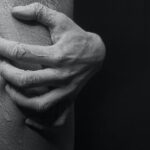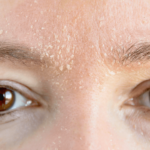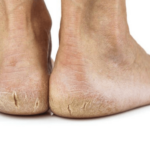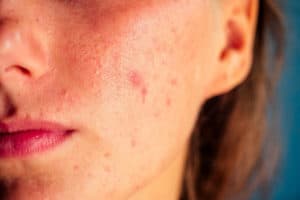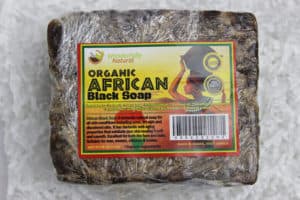A whopping 95% of people between the age of 11 to 30 are affected by acne to some degree [1]. Acne is so common, but many people don’t know if the acne goes away naturally or if they have to be proactive in treating it.
Does Acne Go Away Naturally? Acne (pimples, whiteheads, blackheads, cysts, and nodules) will go away naturally without treatment, depending on the type of skin and severity. Adults who still suffer from acne should be able to control their skin condition with proper treatment.
Read on to learn more about acne, how it goes away naturally on its own, and what you can do to make it clear up faster.
Also, for an excellent exfoliator brush, take a look at our top pick, the Michael Todd Beauty – Soniclear Elite – Facial Cleansing Brush System:
Click here to see it on Amazon.
Does Acne Go Away Naturally?
Acne, in different forms such as whiteheads, blackheads, cysts, papules (small red bumps), pustules/pimples (small red bumps with white or yellow pus), and nodules, usually occurs during puberty, but adults who still suffer from acne are not uncommon.
Acne can usually be found in the areas around your face, back, chest, shoulders, upper arms, trunk, legs, and buttocks.
While acne can go away naturally, dermatologists suggest that you be proactive in treating your acne. Without treatment, your skin can be permanently scarred and disfigured.
The American Academy of Dermatology (AAD) also stated that people who do not treat their acne tend to have low self-esteem, depression, suicide ideation, and anxiety.
How Does Acne Develop?
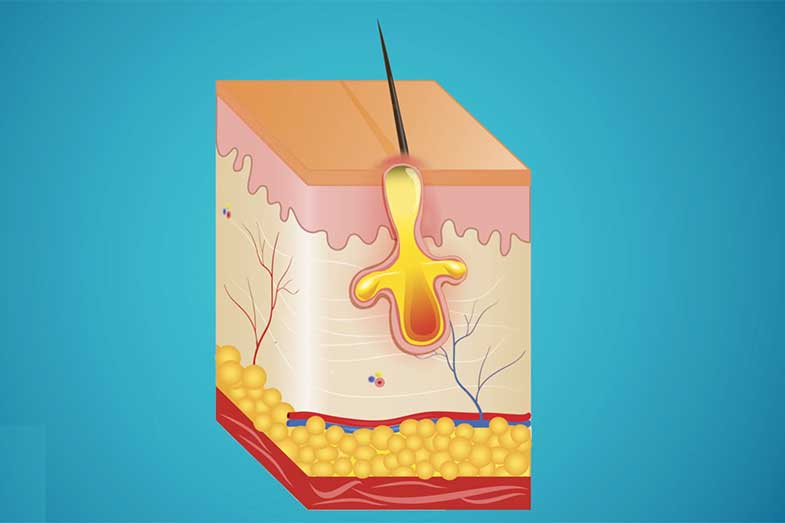
Acne is, simply put, a very common skin disorder that affects the sebaceous glands. The said glands, which are connected to the hair follicles, are responsible for secreting an oily substance called sebum. Sebum, in turn, keeps your skin lubricated and soft.
Whiteheads start to form just beneath the skin’s surface when pores and hair follicles become clogged with dead skin cells, sebum, hair, bacteria, and other dirt accumulated from the environment, whereas blackheads are formed when the clogged materials stretched your pores, causing it to become exposed to air.
The black color, contrary to what many people think, is not dirt but discolored oil as a result of being exposed to air.
Pimples, also known as pustules, are formed when the clogged materials remain clogged, causing irritation, inflammation, and redness. The bacteria (P. acnes) [2] in the clogged material is responsible for the swelling.
The nodule is more serious than the previously discussed form of acne. It is rooted deeply within the skin, is painful, and can cause scarring. Cysts are like nodules, but the former contains pus.
Acne can be classified into:
- Mild (presence of whiteheads, blackheads, a couple of papules and pustules)
- Moderate (distributed whiteheads and blackheads, several papules and pustules)
- Severe (combination papules, pustules, nodules or cysts with noticeable scarring)
How to Make Acne Go Away Faster? My Top 5 Tips
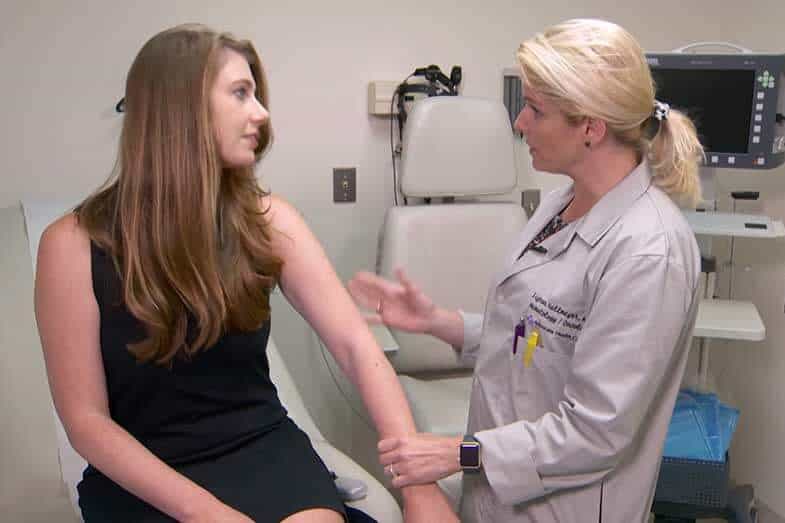
I know acne can be troublesome and frustrating – I had it for many years. It doesn’t matter if it’s your first time dealing with it or not. So to help make your acne go away faster and save you from misinformation, here’s a rundown on how you can make your acne go away faster:
1. Wash Your Face
If you have a couple of pimples or blackheads and want them to go away faster, I highly suggest that you wash your face gently with a mild and non-drying soap (2-3 times a day).
However, if you have severe acne, then this advice is not for you because excessive washing may cause irritation and make your acne worse.
Wash your face to remove your make-up, and wash your face right after you exercise. Use lukewarm water when rinsing. Apply a gentle cleanser with your fingertips.
2. Use the Right Products
Some cosmetic, hair, and even moisturizer products can cause blockage on your skin. You can use cosmetic products but choose primarily water-based, oil-free, alcohol-free, and non-comedogenic (won’t cause pore blockage) products. Also, remember to remove your make-up before bedtime.
Here are three of my all-time favorite acne-fighting products:
Michael Todd Beauty – Soniclear Elite – Facial Cleansing Brush System. This gentle yet effective brush lifts away 99.5% of dead skin, dirt, and makeup. It leaves your skin clear and clean of impurities which will help clear the acne faster and prevent it from coming back.
Click here to see it on Amazon.
Exfoliating Pads. Use these glycolic facial treatment/exfoliating pads each night to not only clean your face, but over time, reduce wrinkles, fine lines, decrease pores, and keep acne away.
Click here to see it on Amazon.
NEURADERM Deep Calming Facial Sheet Mask. This powerful mask will certainly speed up the clearing of your acne. It is packed with beneficial ingredients, including vitamin E, dehydrated algae microspheres, and antioxidants.
Click here to see it on Amazon.
3. Visit a Dermatologist
If you want to make your acne go away but don’t know how or tried every home remedy you found on the internet but have yet to see a good result, then maybe it’s time for you to consult a dermatologist.
Your dermatologist will examine your acne, then depending on the severity of your acne, will suggest an effective treatment that might work for you.
You can talk to a pharmacist if you have mild acne, but if you have moderate to severe acne, then you should talk to a dermatologist.
Talk to your dermatologist about the drugs, medicine, or steroids (especially those with iodine) you are currently taking because those might be causing your acne to flare up.
Oral antibiotics, hormone pills, azelaic acid, and Accutane (isotretinoin), all of which can only be bought and consumed if prescribed, are some of the treatments your dermatologist might recommend if you have severe acne.
The following topical treatments could be prescribed by a dermatologist or doctor:
- Benzoyl peroxide kills bacteria and has a drying effect.
- Topical antibiotics act to reduce the bacteria in your skin as well as inflammation. Topical antibiotics include clindamycin, erythromycin, and metronidazole.
- Retinoids help in preventing pore blockage, thus preventing whiteheads and blackheads from forming.
- Hormonal therapy might also work for women suffering from acne.
Other clinical methods such as surgery (removal of blackheads and whiteheads), cryosurgery (or cryotherapy-removes abnormal tissue with the aid of liquid nitrogen), and steroid injection might also be done to make your acne go away faster.
Remember to avoid the sun and tanning beds when you are treating your acne. During medication, your skin is very susceptible to UV light; thus, it might increase your risk of having skin cancer.
4. Take Care of Yourself
This one is obvious but so commonly overlooked – simply take better care of yourself. This includes better diet, sleep, and exercise/movement. If, upon observation, you think a certain food causes your acne to act up, then it might be time for you to reduce the consumption of those foods.
Oily hair might also be contributing to your pores being blocked, so you should start washing your hair with shampoo regularly to make your acne go away naturally.
Aside from taking care of your physical health, start taking charge of your mental health since emotional stress may cause your acne to worsen.
5. Do Not Squeeze/Pop Your Acne
I know it’s tempting to squeeze or pop them, but before you do that, think of the consequences. Squeezing any form of your acne may cause permanent scarring, inflammation, slow healing, and even irritation. Also, avoid touching your face with dirty hands.
The below video highlights clearly why you should avoid popping pimples:
If you simply must pop that pimple or zit, here is the correct way to do it:
Causes of Acne
Knowing and understanding the causes of your acne will help you in making it go away. Below is a rundown of the real causes of acne:
1. Hormones
During puberty, the body is said to produce more hormones (androgen-type). These hormones are the main reason why your sebaceous glands are active in producing more sebum than your skin needs. Since men produce more androgen-type hormones, they’re more prone to acne.
On the other hand, women are more prone to adult acne. Some of the causes of their adult acne include hormonal changes caused by the menstruation period, pregnancy, birth control pills, or stress. Polycystic Ovary Syndrome (PCOS) might also cause acne to flare up in women.
2. Heredity
Acne does run in the blood. If your parents had acne, then most likely you’ll have acne too. And if one of your parents had adult acne, then you might experience that too.
3. Medications
Some medications tend to trigger acne. Such medications include lithium (used to treat depression and bipolar disorder), steroids, and other drugs for epilepsy.
Conclusion – Does Acne Go Away Naturally?
Does Acne Go Away Naturally? Acne goes away naturally as you get older, especially with the mild type of acne. While acne can heal naturally, treatment is advised to avoid permanent scarring, disfiguration, social anxiety, and depression.
If a medicine from a pharmacy has not worked, you probably need a medicine specifically prescribed for you, and that might take two to three months to work. So you need to be patient and stop the medication only if your dermatologist told you to.
The thing with treating acne is that it can be really frustrating, some treatments or products might be working for some people, but the same products may not work for you.
Again, if your mental health is suffering and you have literally exhausted all the available methods for you to make your acne go away, then it might be time for you to seek professional help.





![Say Goodbye To Wrinkles On The Face [Easy Tips to Prevent Them] wrinkles on face](https://skincaregeeks.com/wp-content/uploads/2023/04/wrinkles-on-face-1-2-150x150.png)
